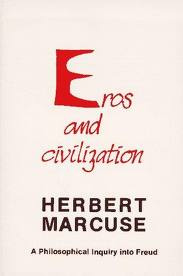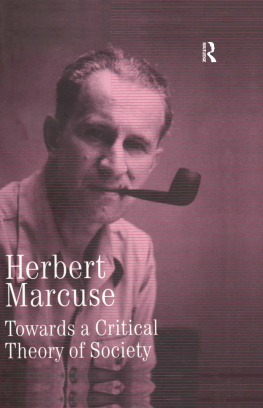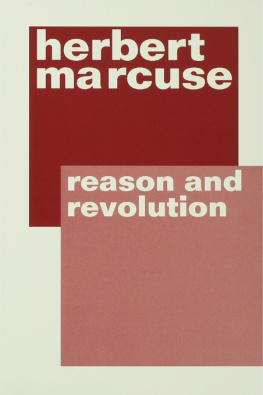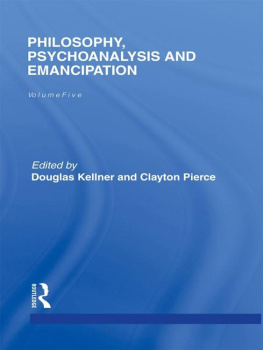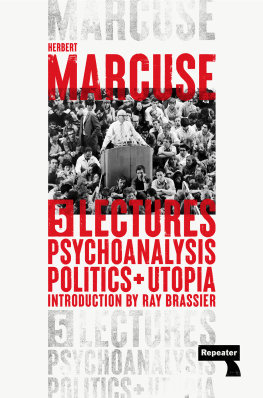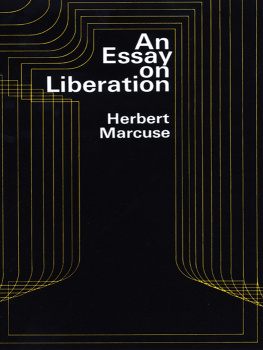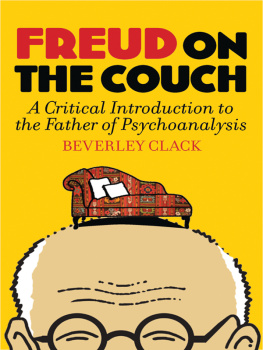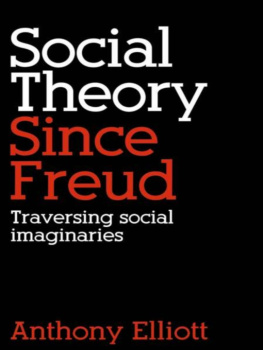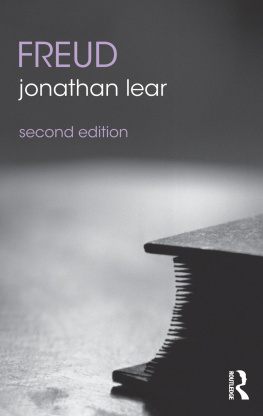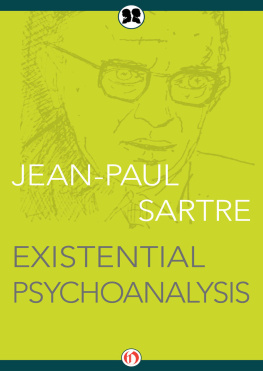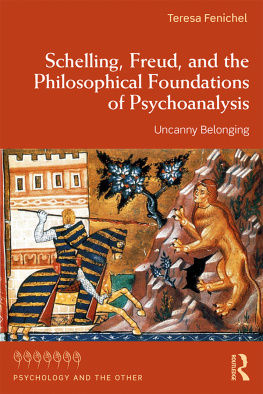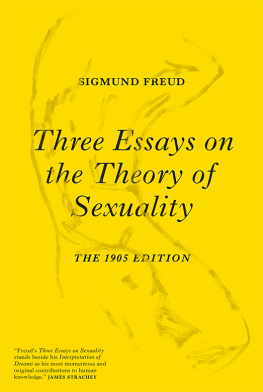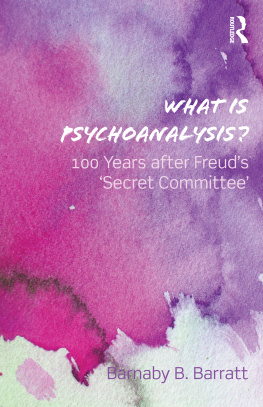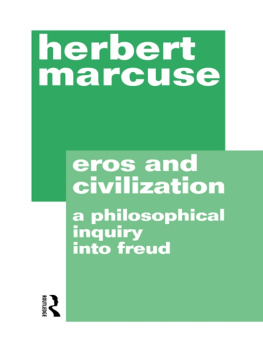Front Matter by Editor, in Eros and Civilization: Philosophical Inquiry Into Freud. by Herbert Marcuse. (Beacon Press, Boston, MA, 1955). pp. iii -8. [Bibliographic Details] [View Documents ]
-- [iii] -
Front Matter
[Title Page and Credits]
EROS
AND CIVILIZATION
A Philosophical Inquiry into Freud
HERBERT MARCUSE
With a New Preface by the Author
BEACON PRESS BOSTON
-- [iv] -
Copyright 1955, 1966 by The Beacon Press
Library of Congress catalog card number: 66-3219
International Standard Book Numbers : 0-8070-1554-7
0-8070-1555-5 (pbk .)
First published as a Beacon Paperback in 1974
Beacon Press books are published under the auspices
of the Unitarian Universalist Association
All rights reserved
Printed in the United States of America
10 9 8 7 6 5 4 3
-- [v] -
WRITTEN IN MEMORY OF
SOPHIE MARCUSE
1901-1951
-- [vi] -
-- [vii] -
Contents
POLITICAL PREFACE 1966
xi
PREFACE TO FIRST EDITION
xxvii
INTRODUCTION
PART I: UNDER THE RULE OF THE REALITY PRINCIPLE
1. The Hidden Trend in Psychoanalysis
Pleasure principle and reality principle
Genetic and individual repression
"Return of the repressed" in civilization
Civilization and want: rationalization of renunciation "Remembrance of things past" as vehicle of liberation 2.The Origin of the Repressed Individual (Ontogenesis)
The mental apparatus as a dynamic union of opposites
Stages in Freud's theory of instincts
Common conservative nature of primary instincts
Possible supremacy of Nirvana principle
Id, ego, superego
"Corporealization" of the psyche
Reactionary character of superego
Evaluation of Freud's basic conception
Analysis of the interpretation of history in Freud's psychology
Distinction between repression and "surplus-repression"
Alienated labor and the performance principle
Organization of sexuality: taboos on pleasure
Organization of destruction instincts
Fatal dialectic of civilization
-- viii -
3. The Origin of Repressive Civilization (Phylogenesis)
"Archaic heritage" of the individual ego
Individual and group psychology
The primal horde: rebellion and restoration of domination
Dual content of the sense of guilt
Return of the repressed in religion
The failure of revolution
Changes in father-images and mother-images
4. The Dialectic of Civilization
Need for strengthened defense against destruction
Civilization's demand for sublimation (desexualization)
Weakening of Eros (life instincts); release of destructiveness
Progress in productivity and progress in domination
Intensified controls in industrial civilization
Decline of struggle with the father
Depersonalization of superego, shrinking of ego
Completion of alienation
Disintegration of the established reality principle
5.Philosophical Interlude
Freud's theory of civilization in the tradition of Western philosophy
Ego as aggressive and transcending subject
Logos as logic of domination
Philosophical protest against logic of domination
Being and becoming: permanence versus transcendence
The eternal return in Aristotle, Hegel, Nietzsche
Eros as essence of being
-- ix -
PART II: BEYOND THE REALITY PRINCIPLE
6. The Historical Limits of the Established Reality Principle
Obsolescence of scarcity and domination
Hypothesis of a new reality principle
The instinctual dynamic toward non-repressive civilization
Problem of verifying the hypothesis
7. Phantasy and Utopia
Phantasy versus reason
Preservation of the "archaic past"
Truth value of phantasy
The image of life without repression and anxiety
Possibility of real freedom in a mature civilization
Need for a redefinition of progress
8.The Images of Orpheus and Narcissus
Archetypes of human existence under non-repressive civilization
Orpheus and Narcissus versus Prometheus
Mythological struggle of Eros against the tyranny of reason -- against death
Reconciliation of man and nature in sensuous culture
9. The Aesthetic Dimension
Aesthetics as the science of sensuousness
Reconciliation between pleasure and freedom, instinct and morality
Aesthetic theories of Baumgarten, Kant, and Schiller
Elements of a non-repressive culture
Transformation of work into play
10. The Transformation of Sexuality into Eros
The abolition of domination
Effect on the sex instincts
"Self-sublimation" of sexuality into Eros
Repressive versus free sublimation
Emergence of non-repressive societal relationships
Work as the free play of human faculties
Possibility of libidinous work relations
-- x -
11. Eros and Thanatos
The new idea of reason: rationality of gratification
Libidinous morality
The struggle against the flux of time
Change in the relation between Eros and death instinct
EPILOGUE: Critique of Neo-Freudian Revisionism
INDEX
-- [xi] -
Political Preface 1966
Eros and Civilization: the title expressed an optimistic , euphemistic, even positive thought, namely, that the achievements of advanced industrial society would enable man to reverse the direction of progress, to break the fatal union of productivity and destruction, liberty and repression -- in other words, to learn the gay science ( gaya sciencia) of how to use the social wealth for shaping man's world in accordance with his Life Instincts, in the concerted struggle against the purveyors of Death. This optimism was based on the assumption that the rationale for the continued acceptance of domination no longer prevailed, that scarcity and the need for toil were only "artificially" perpetuated -- in the interest of preserving the system of domination. I neglected or minimized the fact that this "obsolescent" rationale had been vastly strengthened (if not replaced) by even more efficient forms of social control.
The very forces which rendered society capable of pacifying the struggle for existence served to repress in the individuals the need for such a liberation. Where the high standard of living does not suffice for reconciling the people with their life and their rulers, the
"social engineering" of the soul and the "science of human relations" provide the necessary libidinal cathexis. In the affluent society, the au
-- xii -
thorities are hardly forced to justify their dominion . They deliver the goods; they satisfy the sexual and the aggressive energy of their subjects. Like the unconscious, the destructive power of which they so successfully represent, they are this side of good and evil, and the principle of contradiction has no place in their logic.
As the affluence of society depends increasingly on the uninterrupted production and consumption of waste, gadgets, planned obsolescence, and means of destruction, the individuals have to be adapted to these requirements in more than the traditional ways.
The "economic whip," even in its most refined forms, seems no longer adequate to insure the continuation of the struggle for existence in today's outdated organization, nor do the laws and patriotism seem adequate to insure active popular support for the ever more dangerous expansion of the system. Scientific management of instinctual needs has long since become a vital factor in the reproduction of the system: merchandise which has to be bought and used is made into objects of the libido; and the national Enemy who has to be fought and hated is distorted and inflated to such an extent that he can activate and satisfy aggressiveness in the depth dimension of the unconscious. Mass democracy provides the political paraphernalia for effectuating this introjection of the Reality Principle; it not only permits the people (up to a point) to chose their own masters and to participate (up to a point) in the government which governs them -- it also allows the masters to disappear behind the technological veil of the productive and destructive apparatus which they control, and it conceals the human (and material) costs of
Next page
